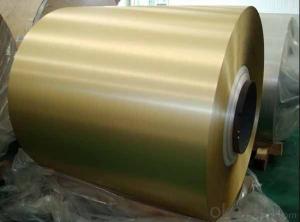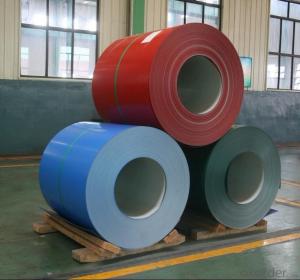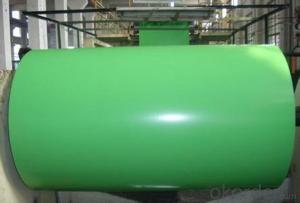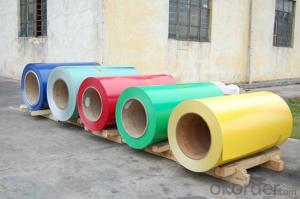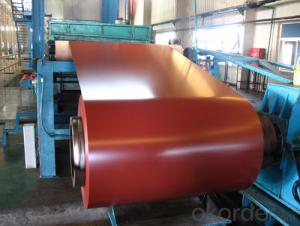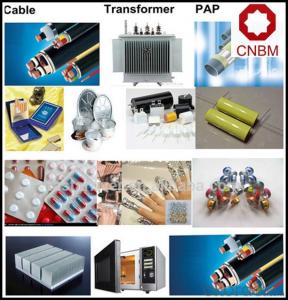Bleach Water Aluminum Coils for Brushed Aluminum Ceiling Decoration
- Loading Port:
- Shanghai
- Payment Terms:
- TT OR LC
- Min Order Qty:
- 5 m.t.
- Supply Capability:
- 10000 m.t./month
OKorder Service Pledge
OKorder Financial Service
You Might Also Like
Specification
1. Specification of Brushed Aluminum Rolls for Ceiling Decoration
characteristics | Application |
1) Super peeling strength | 1) Building exterior curtain walls |
2) Excellent surface flatness and smoothness | 2) Decoration and renovation additions for old buildings |
3) Superior weather, corrosion, pollutant resistance | 3) Decoration of interior walls, ceilings, bathrooms, kitchens and balconies |
4) Even coating, various colors | 4) Shop door decorations |
5) Fireproof, excellent heat and sound insulation | 5) Advertisement board display platforms and signboards |
6) Superior impact resistance | 6) Wallboards and ceilings for tunnels |
7) Lightweight and easy to process | 7) Industrial materials, materials for vehicles and boats |
2. Application of Brushed Aluminum Rolls for Ceiling Decoration
(1).Interior: wall cladding, ceilings, bathrooms, kitchens and balconies, shutters, doors...
(2).Exterior: wall cladding, facades, roofing, canopies, tunnels,column covers , renovations...
(3).Advertisement: display platforms, signboards, fascia, shop fronts...
3. Feature of Brushed Aluminum Rolls for Ceiling Decoration
*Such coil is specially designed to replace aluminum ingot, due to the high export tax of aluminum ingot, the coil has better price than ingot.
*This type of coil can fit customer's remelting furnace just like ingot, no need to make any change to the production line that was previously used for ingot. The standard coil size and weight is very suitable for the feed gate of furnace.
*This type of coil causes less material wastage than ingot when remelted.
*Our coil is made directly from ore, no need to go though the ingot making process, quality is much better than other suppliers who use ingot scrap to make coil.
Be free from Oil Stain, Dent, Inclusion, Scratches, Stain, Oxide Dicoloration, Breaks, Corrosion, Roll Marks, Dirt Streaks and other defect which will interfere with use
4. Certificate:
SGS and ROHS(if client request, paid by client), MTC(plant provided), Certificate of Origin(FORM A, FORM E, CO), Bureau Veritas and SGS (if client request, paid by client), CIQS certificate
5. Image of Brushed Aluminum Rolls for Ceiling Decoration
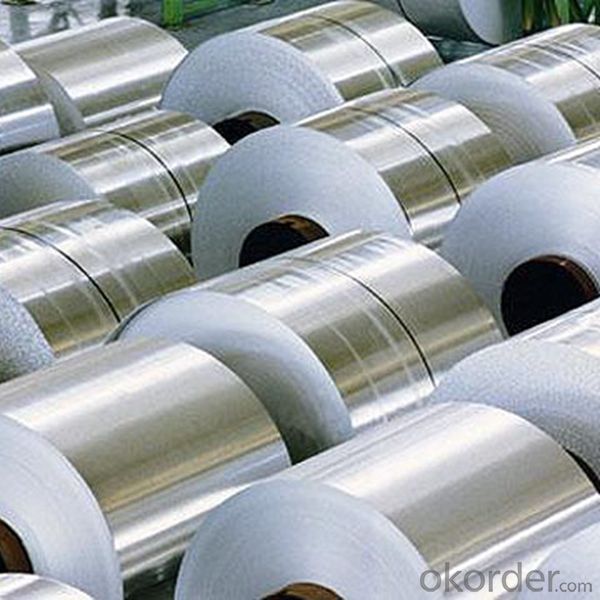
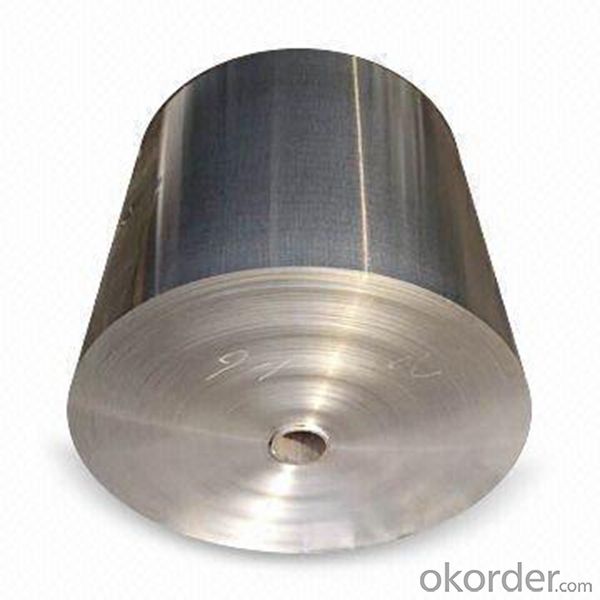
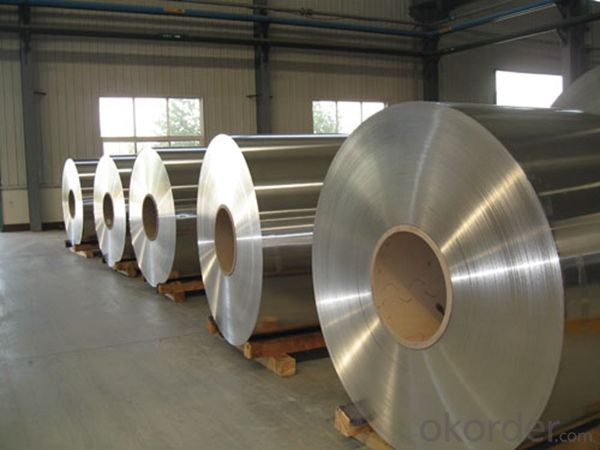
6. Package and shipping of Brushed Aluminum Rolls for Ceiling Decoration
eye to wall
eye to the wall
with wood pallet (wooded case also available)
7. FAQ
1) What is the delivery time?
Dpends on actual order, around 20 to 35 days
2)What is the QC system:
We have QC staff of 20 persons and advanced equipment, each production is with MTC traced from Aluminum ingot lot.
3) What market do you mainly sell to?
Australia, America, Asia, Middle East, Western Europe, Africa etc
- Q: This question asks about the environmental friendliness of aluminum coils.
- <p>Aluminum coils are considered environmentally friendly for several reasons. They are highly recyclable, with the recycling process requiring significantly less energy compared to producing new aluminum. This reduces greenhouse gas emissions and conserves resources. Additionally, aluminum is a non-toxic material that does not leach harmful substances into the environment. However, the environmental impact also depends on the production process, which can consume energy and generate emissions. Overall, when properly recycled, aluminum coils have a lower environmental footprint than many other materials.</p>
- Q: What are the common surface finishes available for aluminum coils?
- Aluminum coils come in various surface finishes, each with its own advantages and aesthetic appeal. One popular option is the mill finish, which is the standard finish applied directly from the mill. It provides a smooth and shiny surface without any additional treatments or coatings. Another common choice for aluminum coils is the anodized finish. This involves an electrochemical process that creates a durable and corrosion-resistant layer on the aluminum's surface. Anodized finishes can be clear or colored, offering a wide range of design options. Painted or coated finishes are also widely used for aluminum coils. This involves applying a layer of paint or coating to enhance appearance and protect against corrosion. The color, gloss level, and texture of painted finishes can be customized to suit different design needs. Brushed finishes are often employed for aluminum coils, creating a pattern of fine lines or scratches on the surface. This unique texture adds visual interest to various applications. Laminating is another option for aluminum coil finishes. It involves applying a thin layer of film or other material to provide additional protection against scratches, UV rays, and other elements. The laminated finish can be glossy or matte, depending on the desired look. In summary, the available surface finishes for aluminum coils include mill finish, anodized finish, painted or coated finish, brushed finish, and laminated finish. Each finish has its own advantages and can be chosen based on specific requirements such as aesthetics, durability, corrosion resistance, and customization options.
- Q: Is it safe or practical to use an electric iron as a heat source for an aluminum coil?
- <p>Using an electric iron to heat an aluminum coil is not advisable. Electric irons are designed to heat their own plates for ironing clothes, not to transfer heat to other materials like aluminum coils. The high temperature of an iron could damage the coil and potentially cause a fire hazard. Moreover, aluminum has a high thermal conductivity, which means it would dissipate heat quickly, making it inefficient to use an iron for this purpose. Always use heating elements specifically designed for the material you intend to heat.</p>
- Q: Can aluminum coils be used in electrical conductors?
- Aluminum coils can indeed be utilized in electrical conductors. With its exceptional electrical conductivity, aluminum ranks second only to copper in this aspect. Its remarkable electrical properties render it suitable for a wide range of electrical applications, including coil production. In fact, aluminum coils are extensively employed in electrical conductors for various purposes such as transformers, motors, generators, and power transmission lines. These coils possess the advantages of being lightweight, cost-effective, and having good thermal conductivity. Nevertheless, it is crucial to acknowledge that aluminum has a lower tensile strength compared to copper. Therefore, it is essential to carefully consider the design to ensure the stability and durability of the coil. Moreover, it is worth noting that aluminum coils may require larger cross-sectional areas than copper coils to achieve the same electrical performance.
- Q: What are the different tempers available for aluminum coils?
- The different tempers available for aluminum coils include annealed, full hard, half hard, and quarter hard.
- Q: This question asks for methods to assess the quality of aluminum coils, which is important for various industries that use aluminum for manufacturing and construction.
- <p>To check the quality of aluminum coils, you should inspect for surface defects such as scratches, dents, or discoloration. Measure the thickness and width to ensure they meet specifications. Test the hardness and tensile strength to verify mechanical properties. Conduct a chemical analysis to confirm the alloy composition. Check for internal defects using non-destructive testing methods like ultrasonic testing. Assess the coil's flatness and straightness to prevent issues in further processing. Finally, ensure proper packaging and storage conditions to maintain coil quality.</p>
- Q: How do aluminum coils compare to steel coils?
- Aluminum coils are generally lighter, more corrosion-resistant, and have better thermal conductivity than steel coils. However, steel coils tend to be stronger and more durable. The choice between aluminum and steel coils ultimately depends on the specific application and desired properties.
- Q: What are the common fabrication techniques for aluminum coils?
- Aluminum coils can be fabricated using several common techniques, including rolling, annealing, slitting, and coating. The primary fabrication technique for aluminum coils is rolling. This involves passing a continuous strip of aluminum through a series of rollers to gradually reduce its thickness and increase its length. The process can be done hot or cold, depending on the desired properties of the coil. To improve the mechanical properties of aluminum coils, annealing is often used. This heat treatment process involves heating the coil to a specific temperature and then cooling it slowly to relieve internal stresses and increase its ductility. This makes the coil easier to work with during subsequent fabrication processes. For cutting wide aluminum coils into narrower strips, the technique of slitting is employed. This involves passing the coil through sharp rotating knives that make precise cuts along the length of the coil. Slitting allows for customization and the production of coils in different widths, which can be used for various applications. Coating is another commonly used fabrication technique for aluminum coils. It involves applying a protective or decorative coating onto the surface of the coil to enhance its appearance and improve its performance. Various types of coatings, such as paint, anodizing, and powder coating, provide corrosion resistance, durability, and aesthetic appeal. In summary, these fabrication techniques are essential in transforming aluminum into coils that meet specific requirements for industries like construction, automotive, and aerospace.
- Q: What does 1060 stand for in 1060 aluminum rolling?
- Aluminum coils can be divided into 9 categories, among which 1060 series is one kind, standing for 1050, 1060. Series 1000 is called pure aluminum plate which contents most aluminum with purity above 99.00% and is most common in general industries. As no other technical elements are involved, the production process is simple and the price is relatively cheap. The majority in the current market are series 1050 and 1060. The last two digits in series 1000 indicate the required aluminum content. For example, the last two digits series 1050 is 50. According to International Grades Naming Principle and Chinese Aluminum Alloy Technical Standard (gB/T3880-2006), the aluminum content of qualified series 1050 must reaches 99.5%.
- Q: I bought a house that is older with aluminum windows, and the last owner did not seem to clean them for quite some time. The aluminum frames are a silvery milky white color and my neighbors that have the same windows look like chrome. I have brushed these windows with scrub brushes and green scouring pads even aluminum wheel cleaner, now my frame is a clean milky grey color, it just isnt polished like my neighbor has it, his is like chrome. I have tried silver polishes and this doesn't remove the grey film either - i need something stronger. Can anyone help???
- try alot of pure white vinigar on them. It works wonders.
Send your message to us
Bleach Water Aluminum Coils for Brushed Aluminum Ceiling Decoration
- Loading Port:
- Shanghai
- Payment Terms:
- TT OR LC
- Min Order Qty:
- 5 m.t.
- Supply Capability:
- 10000 m.t./month
OKorder Service Pledge
OKorder Financial Service
Similar products
Hot products
Hot Searches
Related keywords
